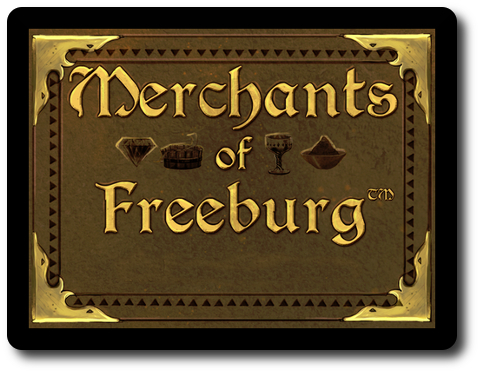
The Basics:
- For ages 8 and up (publisher suggests 12+)
- For 2 to 4 players
- Approximately 180 minutes to complete
Geek Skills:
- Active Listening & Communication
- Counting & Math
- Logical & Critical Decision Making
- Reading
- Strategy & Tactics
- Risk vs. Reward
- Hand/Resource Management
- Bluffing and Misdirection
- Auctioning, Bidding, & Trading
Learning Curve:
- Child – Moderate
- Adult – Moderate
Theme & Narrative:
- Save the town, for a price…
Endorsements:
- Gamer Geek rejected!
- Parent Geek mixed!
- Child Geek rejected!
Overview
Principal author of the Declaration of Independence, Thomas Jefferson, said “Merchants have no country. The mere spot they stand on does not constitute so strong an attachment as that from which they draw their gains.” In this game, the players have no loyalty to the little town of Freeburg, but their fates and fortunes are entwined. To be profitable, one must give.
Merchants of Freeburg, designed by James Sterritt and published by Sterritt Strategy Publishing via the Game Crafter, is comprised of 1 game board, 1 Event die (standard twelve-sided die), 1 Accounting mat, 84 Commodity cards, 10 Title cards, 8 Agent meeples (4 per player), 3 Tall Thief meeples (4 per player), 4 Accounting chits, 8 Amber counters, 4 Onyx counters, 2 Garnet counters, 1 Wheel of the Year counter, 4 Sign counters, 8 Population counters, and 11 Defender chits. The game board is nice and solid, but the Accounting mat is flimsy in comparison (being made of card stock). The other components in the game are of descent quality. Although not necessarily required, having a calculator on hand helps with some of the larger bits of number crunching in the game.
Opening the Market
To set up the game, first place the game board and the Accounting mat in the middle of the playing area.
Second, have each player select their color and take all the meeples of the same color. Then randomly deal to each player 1 Title card each, placing any Title cards not used off to one side. Title cards give players a special ability for the duration of the game. Each player should look at their Title card and read it carefully, as it may help them devise a winning strategy.
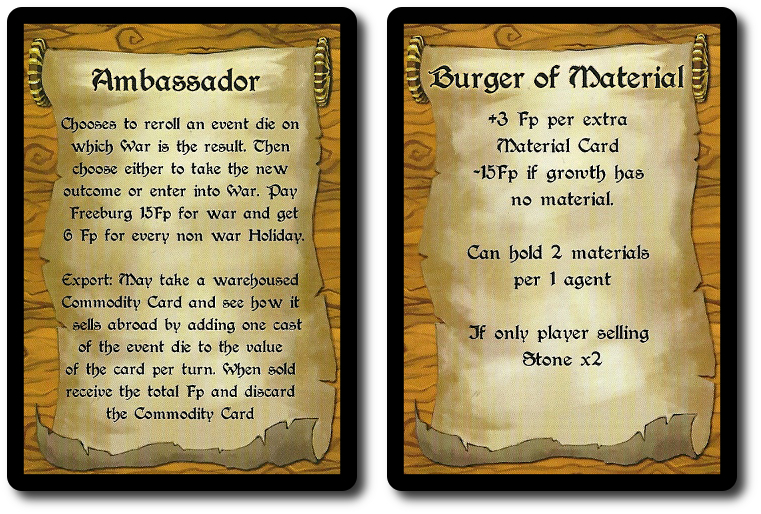
Third, each player takes their Accounting chit and places it on the “30 FP” (FP is short for Freeburg Pieces, the local currency) position on the Accounting mat, stacking the chits so they all fit in the same spot.
Fourth, place a number of Population counters in the Town Square game board space per the number of players in the game. Individuals playing the game for the first time are advises to add 1 additional Population chit to the starting total.
Fifth, Place 4 Defender chits on the Garrison game board space.
Sixth, each player rolls the twelve-sided die. The player with the highest roll gets the “Bürgermeister” Title card and either keeps it for themselves or elects another player to take on the role. The player who takes the “Bürgermeister” Title card then selects another player to take the “Treasurer” title card. It’s worth noting that the Title cards dealt to the players earlier remain with the players at all times. The “Bürgermeister” and “Treasurer” Title cards are special and can be used in addition to the player’s other Title card. These roles are quasi-elected and will change player hands often in the game.
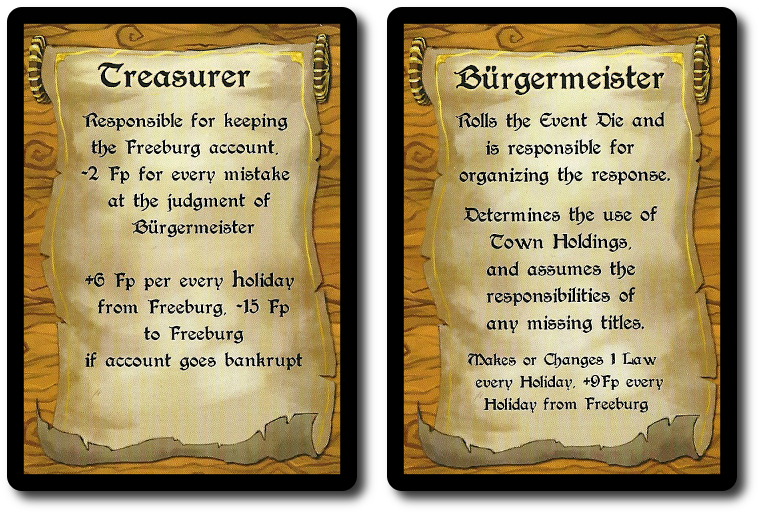
Seventh, shuffle the Commodity cards and place them face-down on the “Draw” space on the game board. This is the Commodity draw deck for the duration of the game. The “Discard” space found next to it is reserved for discarded Commodity cards that are placed face-up. Whenever the draw deck is depleted, reshuffle the discard pile to make a new draw deck and add 1 Population chit to the Town Square.
Eighth, all players can now, in turn order sequence, purchase starting Agents, Stalls, and Signs if they like. Purchasing before the game begins is completely optional.
That’s it for game set up. The player who has the “Bürgermeister” Title card places the Wheel of the Year counter on the Spring spoke found on the game board.
Buy, Sell, Dominate
Merchants of Freeburg is played in rounds and turns. Rounds are noted as “Turns” in the game and are kept track of by moving the Wheel of the Year chit on the Wheel of the Year space found on the game board. The Wheel of the Year has spokes that are used to track the game’s progresses, as well as special times during the game referred to as “Holidays”. Depending on what spoke the Wheel of the Year is on (standard or holiday), the round is slightly different. Each are summarized here.
Standard Round
Step 1: Draw Commodity Cards
Each player draws 1 Commodity card for every free warehousing Agent meeple they have available. The drawn card may be given to the Agent to warehouse (hold) or donated to Freeburg. Players can draw 1 bonus Commodity card for the first Commodity card they donate. This is a great way to ditch a Commodity card you don’t want by being charitable at the same time. But players should take special note of what they have. Some Commodity cards are particularly effective against certain events and conditions. These might be worth hanging onto just in case the worst possible scenario occurs.
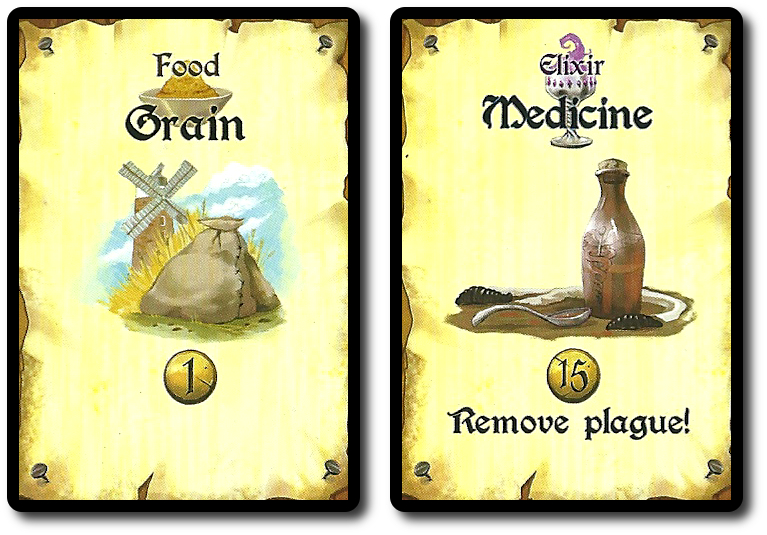
Step 2: Thieves!
Only used when playing an advanced game (which is explained below). If advanced rules are not being used, this step is skipped.
Step 3: Negotiate Place of Sale
One of the more interesting aspects of Merchants of Freeburg is the high level of table talk and engagement with opponents. Players are encouraged to trade with each other by giving FP, other Commodity cards, and even making promises. The goal is to make as much money as one can in the market, either at the moment or in the very near future. Haggling is the best way to go about it, but all agreements must be made at the table and in front of the other players. This step is all about influencing other players in hopes of profiting.
Step 4: Select Commodity Cards
This step requires the players to take their Commodity cards and place them, face-down, to the Stall spaces found on the game board. Commodity cards represent the different goods individuals will sell, trade, and buy in the game’s economy. Agreements made during the previous step will influence the placement of Commodity cards.
Step 5: Tally Gains
Once all the players have placed their Commodity cards, they are flipped over and the price of each item is determined. Bonuses and multipliers can also be included, making a seemingly cheap piece of merchandise into a priceless treasure. All sold Commodities are placed in the Market stack and gains are kept track of on the Accounting mat.
Step 6: Pay for Agents
Players must pay 1 FP for each Agent they want to keep in their service.
Step 7: Negotiate Goods and Services
Now the players open negotiations on just about everything else in the game. Remaining Commodity cards, Agents, FP, anything! Like the last negotiation period, all deals must be done and open at the table.
Step 8: End of Turn
Only after all the players have agreed to end the round, the player currently holding the “Bürgermeister” Title card ends the round and advanced the Wheel of the Year chit.
This ends a standard round. The Bürgermeister collects 3 FP and the Treasurer collects 2 FP.
Holiday Round
Holiday rounds (noted by the dark and bright-colored lines on the Wheel of the Year calendar) are very different from the standard round. At anytime during the round, any player can call for a vote of no confidence in hopes of electing a new Bürgermeister. The newly elected Bürgermeister picks up where their predecessor left off after they assign a new Treasurer (or keep the old one).
Step 1: Roll Event Die
The Event die is rolled and the resulting number indicates what fate befalls the small town of Freeburg. The die value is matched to the same number on the Wheel of the Year. Event could include famine (food costs more), an outstanding harvest (twice the food production), war (reduces defenders of Freeburg, making the population open to attack), and even the untimely death of the player currently in possession of the “Bürgermeister” Title card.
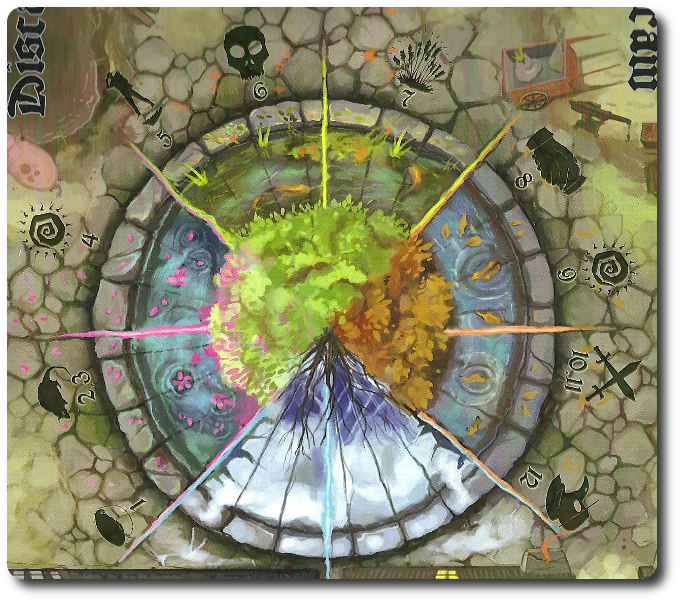
Step 2: Thieves!
Only used when playing an advanced game (which is explained below). If advanced rules are not being used, this step is skipped.
Step 3: Census
The population of Freeburg is accounted for.
Step 4: Pay the Defenders
The defenders of Freeburg are paid.
Step 5: Change the Law
Only used when playing an advanced game (which is explained below). If advanced rules are not being used, this step is skipped.
Step 6: End of the Holiday
The player currently in possession of the “Bürgermeister” Title card calls an end to the holiday and the round, advancing the Wheel of the Year chit.
Master of Merchants
If the population of Freeburg drops to zero, all the players lose the game. However, if Freeburg reaches a population of 8, then the player who has the most FP wins at the end of the next Holiday.
Game Variants
A number of more advanced rules can be included to elevate the difficulty (and fun) of the basic game. They are summarized here.
Thieves!
Using this advanced rule introduces crime to the good town of Freeburg. Each player takes on the role of not only a merchant, but as an up-and-coming crime boss, too. Players get to use Thieves to do their bidding, which is mostly stealing, disrupting others, and vandalism. Thieves can even be sent out into Freeburg to do whatever they like, but the player will always get a cut of their score. Thieves caught are sent to the Dungeon and there they will remain until pardoned or they figure out how to escape.
Change the Law
A number of laws are provided in the game that the Bürgermeister can activate. These include making all verbal agreements binding, inflicting fines on players who have too much of a certain good or too many Agents, and even giving the Bürgermeister a raise. Players can make their own rules, as well, which is not a great idea when you consider how quickly they can be bumped from their office.
Additional Seasonal Effects
The seasons can be used to introduced additional effects. For example, during Winter the population will not grow unless the number of Commodity cards representing clothing is equal to or higher than the current population number.
To learn more about Merchants of Freeburg, visit the game’s web page.
Final Word
The only aspect of the game the Child Geeks liked was the negotiation and the role of Bürgermeister . The act of yelling at each other, high-fiving after making a deal, and arguing about how the other player reneged on their promise was good fun for the loud Child Geeks. The Bürgermeister was almost always quickly voted out of office and anyone who had it quickly became corrupt. Which, again, was a lot of fun for the Child Geeks. Everything else about the game was not enjoyed. As one Child Geek put it, “I like the trading, but everything else about the game isn’t any fun.” Another Child Geek said, “I just want to be a merchant, but the game wants me to feed peasants, protect the town, and other stuff. Dude, I just want to make money.” And finally, the biggest complaint we heard from the Child Geeks was the game’s length. Three hours of sitting at the table was way, way, way too long for the kids. When the games were over, the Child Geeks voted to reject Merchants of Freeburg, finding it to be a game that took longer than they liked and didn’t thrill them enough to make it worth while.
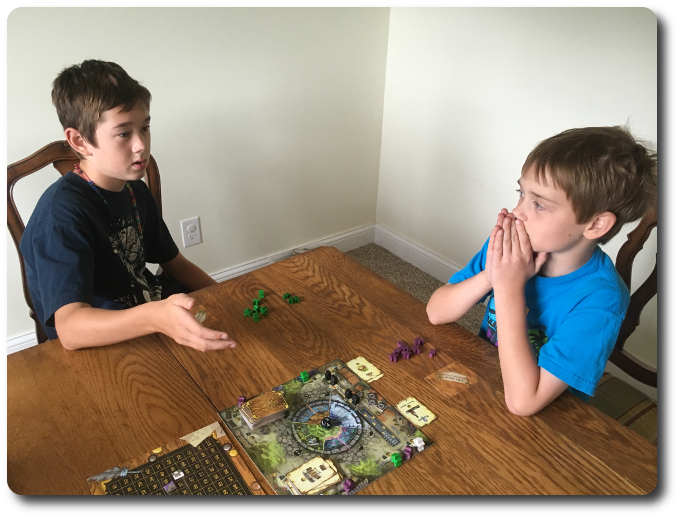
The Child Geeks discuss the pros and cons of electing a new Bürgermeister
The Parent Geeks were able to understand the subtle nuances of the game to a greater depth than the Child Geeks. This resulted in their game playing experience being much more positive, but not outrageously so. According to one Parent Geek, “I like a lot of things about the game, but I have a hard time connecting them together to form a strategy.” Another Parent Geek said, “This is one of those game I think you both like and dislike equally. There are things I want to keep and other things I want to throw away, but you can’t have the game without both.” Non-gamer Parent Geeks had difficulty mustering up a plan, but were able to play the game with the same ease as the more skilled players. A three-hour game length was not appreciated by about half our players, but games seldom lasted more than 2 hours with proficient players. When all the trades were over, the Parent Geeks gave Merchants of Freeburg a mixed approval.
The Gamer Geeks liked many aspects of the game, but disliked how it was put together. According to one Gamer Geek, “This game feels like a lot of great ideas thrown together, blended, and then pour into a game box. Nothing really matches, but you can see how they could.” Another Gamer Geek said, “This game has promise, but not in its current state. It needs to be revamped, tightened, and tweaked to resolve a lot of little issues that equal into one big disappointing experience.” The Gamer Geeks became very frustrated with the game, enjoying moments of pure blissful game play, only to quickly be sent down a game design hole. It was an emotional ride. When the market was closed, the Gamer Geeks voted to reject Merchants of Freeburg.
The rule book for the game is difficult to navigate and seemingly contradicts itself often. Information is eluded to and often found in different sections, allowing for reasonable assumptions to be made, but hunting for specifics is always frustrating. This is especially true when one player wants a rules clarification but none is to be found, holding up the game as players attempt to find the information needed. I do not recommend this game to new and inexperienced players, as the rule book makes the game feel and seem much more complicated than it really is.
There’s a lot going on in this game. Almost too much, I’d say. Players have to keep Freeburg healthy, populated, defended, make money, make sales, pay employees, and play at politics. That’s a lot to juggle and the game feels very heavy as a result. Individual steps are easy, but when combined, even the simplest of decisions can feel painfully important and nothing really flows. Different steps during the rounds feel unique, but the transition between them feels jarring. It’s difficult to get a rhythm as a result.
Players can recover from mistakes fairly easily if they can figure out how best to negotiate with the other players. I’ve seen a player who was woefully behind make an amazing comeback by trading, making deals, and taking advantage of negotiation laws. Brilliant stuff. On the downside, players who cannot negotiate well or don’t understand the value of certain aspects of the game will not win. Ever.
I’m a fan of what the game is attempting to do, but not a fan of how it’s going about it. I didn’t care for the game, as a result. I spent too much time explaining and looking up rules than actually playing the game. Considering the game could take up to 3 hours to complete, that’s rather telling. I knew what the game wanted me to do, but had a very difficult time determining how the game wanted me to go about it. The same for most of our players, as the endorsements reflect. Merchants of Freeburg is an ambitious game that has reached a bit too far, resulting in a game playing experience that is stretched thin and lacks its center. This is a game to watch, but I’d hold off on playing it just yet.
This game was given to Father Geek as a review copy. Father Geek was not paid, bribed, wined, dined, or threatened in vain hopes of influencing this review. Such is the statuesque and legendary integrity of Father Geek.

